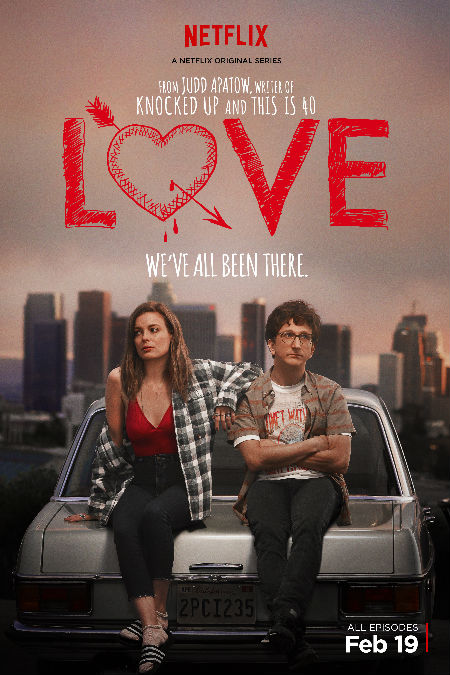
It was ABBA who once sang, in one of their more obscure early releases, that “Love Isn’t Easy (But It Sure is Hard Enough)”.
In a nutshell it summed up everything that many of us feel about love.
On the surface love is all wine and roses, romantic dinners with sunset backdrops and whispered I Love Yous; but the reality for many people is that it is also confounding, messy, uncertain and contradictory, mired between romantic ideals on one side and the grim day-to-day reality of maintaining an intimate connection with another flawed human being on the other.
It’s in this dramatically-fertile middle ground that Netflix’s Love, created by Judd Apatow, Paul Rust (who stars as one half of the protagonist couple at the centre of the show) and Lesley Arfin resides, a decidedly modern romantic comedy that dares to be frank and honest about the business of love.
But more so about how it is that two disparate individuals, who by rights shouldn’t have a hope in hell of making a connection fruitfully multiply into a relationship, have to struggle within themselves and with each other, meet cute nortwithstanding, to make it all work.
And sweet, dorky, doormat Gus (Paul Rust), who is dumped by his girlfriend Natalie (Milana Vayntrub) because he is way too “faux nice” and brassy, addictive personality Mickey (Gillian Jacobs) are about as different as you could hope for.
Which in the trope-defined world of romantic comedies would usually mean they are completely, irrevocably right for each other and that love will follow their awkwardly adorable but swear-punctured meet cute as surely as day follows night.
Ah ah ah though, not so fast!
What grants Love a refreshing new take on the business of meeting, falling in love and making that elusive thing called a relationship work, is that it dares to examine, I mean really examine, just how broken people can be. And thus by extension how broken the business of love can be.
Neither Gus who meekly acquiesces with just about everyone in their life including his employer – he works as tutor for a child actor on a cheesy nighttime soap called Witchita and is regularly rebuffed in his attempts to do his job – or Gillian, who can’t quite best her addictions despite her devil-may-care bravura, are exactly the poster children for emotional togetherness.
In that respect they are delightfully and truthfully real, two people who aspire to greatness in their lives which naturally includes falling in love but who routinely fail to get anywhere close to where they want to be.
It’s that authenticity, that inability many of us have to bridge the gap between what we want and what we get that fuels Love and lends a charming believability with which anyone who’s even been grazed by Cupid’s arrows will have some familiarity.
Even the meet cute, the traditional moment in a romantic comedy when the intended twosome come together for the first time isn’t exactly the stuff of Harlequin novels.
In short order, Mickey can’t pay for her coffee at a convenience store, Gus steps in to save the day, they get talking, he walks her home, she realises she’s lost her wallet at a cult meeting the night before – long story, don’t ask – gets Gus high, buys him breakfast, he throws out all his unrealistic Blu-Rays on the street and promptly falls asleep (missing the fact that he and Mickey have exactly the same taste in rugs; trust me, this matters and is kind of cute).
What comes through all this messiness is the fact that, for all their obvious differences, each of them want the same thing – a real connection that relies less on bullshit implausibilities and way more on an actual sharing of common interests.
Of course they want all the romantic bells and whistles – who doesn’t? – but they’re realistic enough to know that that’s not all love is, and that it’s the 90% of the iceberg below the rose-strewn surface that often waylays most people.
But realisation is one thing, actually putting this into practice quite another and despite the unexpected and at times adorable connection between the two lost souls, both of whom try different unfulfilling things to find themselves, it’s that facet of love in the modern age that looks like it might the challenge for these thoroughly engaging characters.
Love looks like being as much an exploration of how two people make an accommodation with their own hopes and dreams as much as it is about them coming together in a relationship.
It’s a novel approach since most romantic comedies tend to feature one-note cardboard cutout characters who are different yes but only until they get together at which a blissful meshing ensues.
But real love is never that easy or straightforward and the rewarding aspect of Love, which winningly dances between serious insight, swear-laden black-ish humour and some genuinely sweet moments, is that doesn’t appear to profess that it is or ever will be.
True love may win out but getting there is going to a hilariously flawed exercise in the show, just as it is in real life.